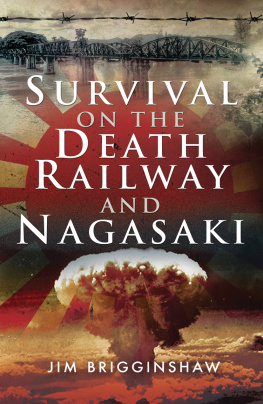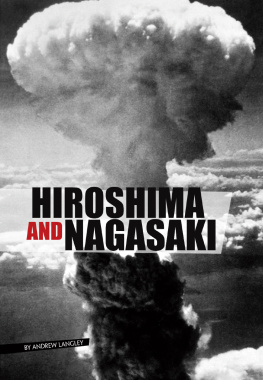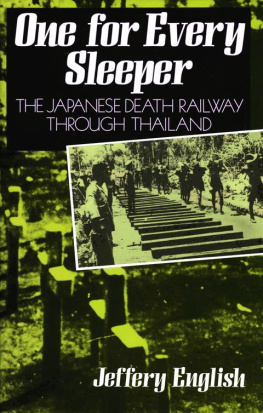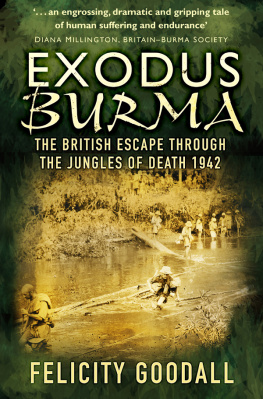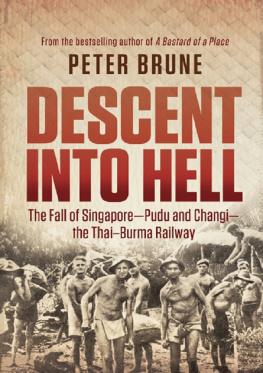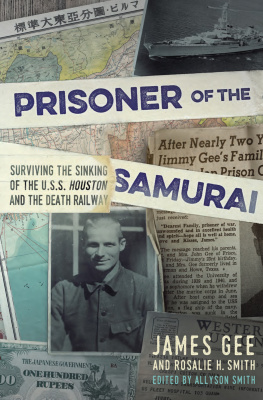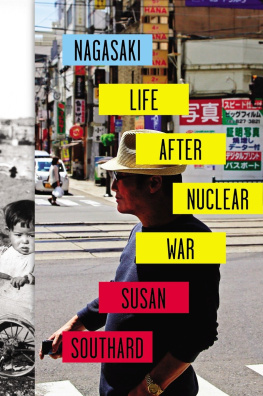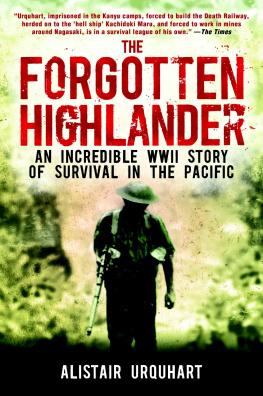Pagebreaks of the print version

SURVIVAL ON THE DEATH RAILWAY AND NAGASAKI
JIM BRIGGINSHAW
SURVIVAL ON THE DEATH RAILWAY AND NAGASAKI
JIM BRIGGINSHAW
First published in Australia in 2018 by Big Sky Publishing Pty Ltd as The Hell Pits of Sendryu
First published in Great Britain in 2018 by
Pen & Sword Military
An imprint of
Pen & Sword Books Ltd
Yorkshire - Philadelphia
Copyright Jim Brigginshaw, 2018
ISBN 978 1 52674 010 6
eISBN 978 1 52674 011 3
Mobi ISBN 978 1 52674 012 0
The right of Jim Brigginshaw to be identified as Author of this work has been asserted by him in accordance with the Copyright, Designs and Patents Act 1988.
A CIP catalogue record for this book is available from the British Library.
All rights reserved. No part of this book may be reproduced or transmitted in any form or by any means, electronic or mechanical including photocopying, recording or by any information storage and retrieval system, without permission from the Publisher in writing.
Pen & Sword Books Ltd incorporates the Imprints of Pen & Sword Books Archaeology, Atlas, Aviation, Battleground, Discovery, Family History, History, Maritime, Military, Naval, Politics, Railways, Select, Transport, True Crime, Fiction, Frontline Books, Leo Cooper, Praetorian Press, Seaforth Publishing, Wharncliffe and White Owl.
For a complete list of Pen & Sword titles please contact
PEN & SWORD BOOKS LIMITED
47 Church Street, Barnsley, South Yorkshire, S70 2AS, England
E-mail:
Website: www.pen-and-sword.co.uk
or
PEN AND SWORD BOOKS
1950 Lawrence Rd, Havertown, PA 19083, USA
E-mail:
Website: www.penandswordbooks.com
AUTHORS NOTE
ANGRY, argumentative, a living skeleton that was the Jim Bodero I met 27 years after the war had ended. Id just taken over as editor of the newspaper where he was a compositor/reader, the scourge of any journalist who mutilated the English language.
I understood his irascibility when I learned of the terrifying ordeals hed been through as a prisoner of the Japanese, ordeals that for 27 years had left him in constant agony from a multiplicity of injuries.
He was a bitter man, not towards the Japanese who had caused his injuries, but towards Australian officialdom. Never out of pain from his damaged back and limbs, eyesight partially lost from a scarred cornea, Jim Bodero had his post-war claims for a Repatriation pension rejected.
Twenty years after the war ended, he aggravated the injuries to his back while working, but was refused workers compensation by the insurance doctors, who said the injury was pre-existing. Of course it was pre-existing, the Japanese guards had seen to that.
Yet in contrast to Australias denial, the Japanese had paid him compensation when he was nearly blinded while working down a coalmine in their country.
I often offered to write about his experiences, but he always refused, saying he didnt want to talk about the war. Then one day he asked me to tell his story.
When I started writing it, I was surprised by the extent of his memory. He was able to recall names, places, dates and incidents with vivid clarity.
We met only when he was well enough, and it took me the best part of twelve months before I had his story down on paper. I had just finished when I received a phone call. Jim Bodero was dead.
It was strange that after refusing me for so long, he had asked for his story to be told, strange also that he should have lasted just long enough for it to be completed.
CHAPTER ONE
THE FALL OF SINGAPORE
BANKNOTES, hundreds of them in all denominations, littered the street. Australian boots were trampling them into the dust but no one stopped to pick up the money. The men knew theyd get a vicious jab from a Japanese rifle butt if they so much as faltered on the march to Changi Prison.
The money was no good, anyway. It was Straits Settlement dollars, worth nothing now that Singapore had fallen. Looters had thrown it away.
Still, it had Sol Heffernan drooling. I might just do up me bootlace and pick up a motza-enough to retire to the south of France with a randy blonde for company.
Trying to keep in step alongside him, Jim Bodero whispered that itd be a bloody silly move. The stuffs not worth the paper its printed on.
I know that, but Ive never been close to so much dosh in all me life. Sol took a kick at a thick bundle. It flew into the air and banknotes fluttered to the ground like outsize confetti. A six-pointer! he yelled, remembering the time when he was scoring goals as the full-forward for Collingwood.
A jab in the ribs from a rifle butt knocked him off his feet. He fell in the dirt among the banknotes and other debris of war.
His mates marched on. They knew better than to stop to help him.
The guard raised his rifle above Sols head. The marchers, looking back, despaired for him, but Sols skull wasnt smashed in. The rifle was held menacingly until he struggled to his feet and staggered after the others.
The march continued as if nothing had happened. In the gutter, an executed mans head, severed by a Japanese sword and impaled on a pole, displayed a death grimace as if amused at the proceedings.
The men of C Company 2/26 Battalion had been in Singapore for a week when they were captured. Singapore, the last bastion after the failure to stop the Japanese advance down the Malayan Peninsula, was regarded as impregnable.
Together with the 2/29 and 2/30 battalions, and under direct control of the British Malayan Command, the men had crossed the causeway to Kranji on the islands northern coast and dug in. They could see hordes of Japanese massing in Johore, arrogantly making no attempt to conceal themselves. This contempt riled the Australians, who submitted repeated requests for permission to shell the enemy positions, but the British garrison brass refused.
One frustrated Australian artillery officer decided to do it anyway, and had his gun crews fire several shells. They didnt cause much damage, but the sight of the Japanese scurrying for cover was a boost to morale.
The British Malayan Command was ready to court martial the Australian officer for his breach of its orders, and he only avoided this fate because the imminent attack kept them too busy.
Enemy planes and observation balloons, secure in the knowledge they had no aerial opposition, filled the skies above the Australians dug-in positions. In their slit trenches, two men to a trench, company platoons waited for the onslaught. Jim Bodero and Peter Murphy reinforced the roofing of their trench with heavy sleepers ripped up from the railway line.
The Japanese started a selective program of artillery harassment. Over an hour or more, theyd land hundreds of heavy rounds on a position, and then switch their attention to another, then another. They had ample ammunition, while the defenders had to conserve theirs.
The dug-in troops, expecting a full-scale attack to come at night, were particularly vigilant after dusk, but in daylight they relaxed sufficiently for inveterate gambler Peter Murphy to organise poker games in the Company Command building, a large, well-reinforced structure in a central position.
Play was often interrupted by fierce enemy shelling. When this happened, the cards were forgotten in the mad rush to get back to the slit trenches. In one of the hurried evacuations, Peter Murphy tried unsuccessfully to bar the exit, calling them a pack of dingoes for letting a few shells interrupt the game. It wasnt until the barrage eased and players drifted back to the game that Peter told them, I was holding the only decent hand Id had all day and you pikers pissed off.

